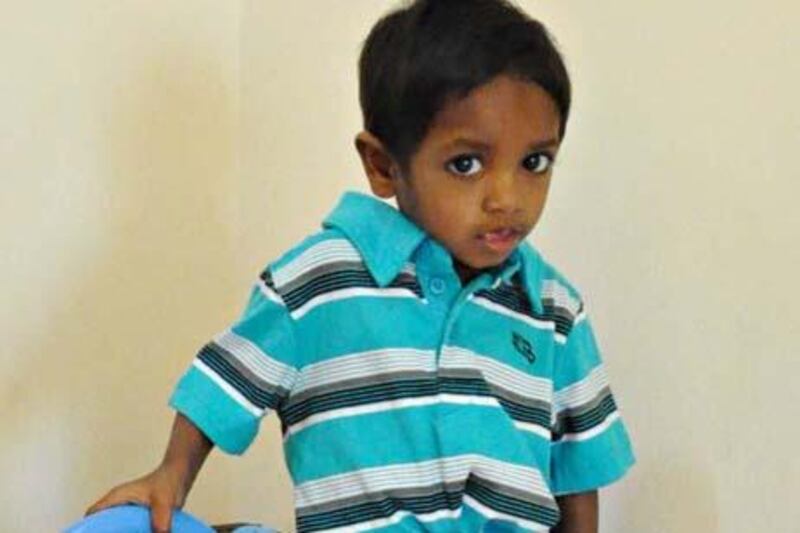DUBAI // Two-year-old Jaisen Arul Selvan has spent most of his young life indoors. Frail, underweight and protected by his parents, he has had only one playmate - his sister, Janice, 4.
Three months ago, his family found out the reason why their little boy picked up germs so easily after doctors diagnosed he had a rare and deadly condition.
But yesterday his family were given a ray of hope after finding out Janice was the perfect donor for the bone-marrow transplant that could be the start of Jaisen's recovery.
"This is the best news I have heard in days," said Prasinna Rajaseelan, Jaisen's mother. "I have been continuously crying since he was diagnosed three months ago. But medical reports indicate that my daughter's stem cells are an absolute match. His recovery chances now are very high."
Jaisen suffers from a condition called Severe Combined Immunodeficiency (SCID). Known as the bubble baby syndrome, it severely impairs the immune system, leaving the body vulnerable to germs.
The mother and son are in a private hospital in Chennai, India, where Jaisen has been in treatment for the past two weeks for a viral infection.
His treatment would involve the transplantation of stem cells from his sister's bone marrow. For more than three months, he would be placed inside an isolated section of a hospital, where he would be shielded from germs - and from contact with other human beings.
"The first 100 days after the transplant is the most crucial time as the doctors have to see if his body is accepting the cells," his mother said.
Since Jaisen's birth in Dubai in 2009, he has been in and out of hospitals because of recurring lung infections and illnesses.
"He was initially being treated for asthma. It is the worst punishment to see your child suffer this way," said Mrs Rajaseelan, who quit her job to care for her son.
"We had to keep him at home most of the time to prevent infections," said Arul Selvan Rajaseelan, Jaisen's father. "He gets cranky when he is not allowed outdoors. But he is usually happy playing with his sister."
The Dubai-based IT professional said he hoped the transplant would save his son.
The disease is estimated to affect about one person in a 100,000, but doctors say this figure could be much higher.
Jaisen's condition became widely known during the 1970s and 1980s, when the American boy David Vetter was diagnosed. David, who was nicknamed the "bubble boy", lived in a large, plastic, germ-free bubble.
Less than 10 seconds after he was born, he was placed into the sterile environment that became his home for most of his life. His story inspired the 1976 film, The Boy in the Plastic Bubble, starring John Travolta.
Researchers and family members tried to give David a normal life by making provisions for him to watch television and play inside his bubble. He even had a formal education, had friends, and played and fought with his sister, Katherine. However, David died at 12 years old after a bone-marrow transplant from his sister failed to match.
But that is where Jaisen's parents hope his story will differ from David's. The Rajaseelans believe their son has a good chance to lead a normal life because Jaisen's sister tested as a perfect match.
The family is yet to decide if the specialised operation he needs should be performed in a hospital in India or in the UK, where the cost of the transplant is estimated at £250,000 (Dh1.5 million). Friends and colleagues have set up a Facebook page, Help save Jaisen, to assist the family in raising the money should they opt for the procedure to be performed in the UK.





